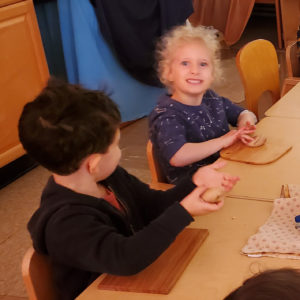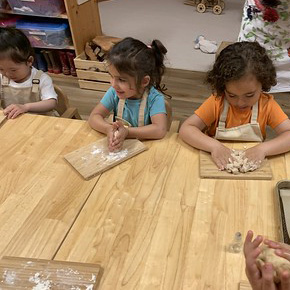by Ashley Brickeen | Admissions Director Nursery School -Grade 8
What are the children doing when they bake bread in Early Childhood?
They are:
- developing fine motor strength and control: kneading the dough and shaping the loaves strengthens the hand muscles and improves manual dexterity.

- exploring with their senses: baking engages the senses of sight, touch, and smell. Working with the dough, children notice how the dough becomes smooth with kneading and how the stickiness and tension of the dough changes as they work with it. Later, after baking, they experience the taste of the fresh bread and how the application of heat transforms the uniform dough into a crunchy outer layer with a soft inside.
- strengthening bilateral coordination: developing good bilateral coordination skills can help children to tie shoelaces, cut with scissors and draw a line with a ruler. Rolling balls of dough, and flattening dough with their hands allow children to develop their bilateral coordination skills.
- developing attention and goal setting: baking bread requires care, patience, and a willingness to delay gratification. Children carefully follow and mimic the movements of their teacher, paying close attention to her words and movements. They need to wait for the delicious bread to bake before they can enjoy it.
- developing an understanding of process and sequence: in class, children will grind wheat to make the flour. As they prepare the dough and knead it, they see that the process of baking bread has a beginning, middle, and end as it moves from wheat to dough to bread.
- developing a sense of efficacy (“I can do it!”): young children need opportunities to do real, meaningful tasks. In baking bread, they make something delicious that they can enjoy and share. Baking and other “chores” contribute to children’s emotional development and self-assurance as they build confidence in their abilities and understand the meaning behind their work (we bake so we can eat bread; we clean so we can have a tidy classroom). It also encourages independence as children learn to take responsibility while following directions and solving problems.
- developing a sense of community: we bake bread together as a class and then sit down together to enjoy it. During snack time, children and teachers share conversation and stories.
 In the Waldorf curriculum, especially at the Nursery School and Kindergarten level, the emphasis is on the process, not the product. Worrying about achieving perfect, smooth loaves would defeat that purpose. The learning is through doing.
In the Waldorf curriculum, especially at the Nursery School and Kindergarten level, the emphasis is on the process, not the product. Worrying about achieving perfect, smooth loaves would defeat that purpose. The learning is through doing.
In the same way, over-explaining the purpose of an activity robs the young child of the chance to explore, discover, and observe on their own. It takes away some of the magic of discovery.
These are just some of the reasons we bake bread as part of the Early Childhood curriculum.

